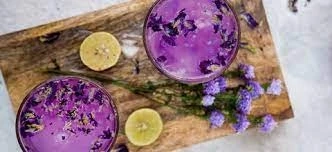In the world of teas, one distinctive brew has captured the attention of tea enthusiasts and health-conscious individuals alike – blue tea. Also known as butterfly pea flower tea, blue tea has gained popularity not only for its mesmerizing blue hue but also for the array of potential health benefits it offers. In this article, we delve into the intriguing world of blue tea, exploring its origins, preparation, and the remarkable benefits it brings to the table.
The Origins of Blue Tea
Blue tea, derived from the butterfly pea flower (Clitoria ternatea), is native to Southeast Asia, particularly Thailand, where it has been a traditional herbal remedy for centuries. The vibrant blue color of the tea is a result of anthocyanin compounds present in the flower petals, which are sensitive to changes in pH levels. When steeped in hot water, the petals release their color, resulting in a visually stunning blue beverage.
Preparation and Flavor Profile
Preparing blue tea is a simple process. Dried butterfly pea flowers are steeped in hot water, and the resulting infusion can be enjoyed on its own or mixed with other ingredients to create visually appealing and flavorful beverages. One unique feature of blue tea is its chameleon-like ability to change color. Adding a few drops of acidic ingredients like lemon juice transforms the blue liquid into a brilliant shade of purple, making it a favorite among mixologists and creative culinary enthusiasts.
In terms of flavor, blue tea offers a delicate, earthy taste with a mildly floral undertone. Its subtle profile makes it a versatile base for various beverage creations.
Health Benefits of Blue Tea
Rich in Antioxidants: The anthocyanins in blue tea are potent antioxidants that help protect cells from oxidative stress. These antioxidants are linked to potential benefits in reducing the risk of chronic diseases and promoting overall well-being.
Anti-Inflammatory Properties: Blue tea's constituents have been studied for their anti-inflammatory effects. Regular consumption of blue tea might contribute to alleviating inflammation, which is often associated with various health issues.
Digestive Aid: Blue tea has been traditionally used to aid digestion and soothe gastrointestinal discomfort. Its gentle nature makes it a suitable choice for individuals with sensitive stomachs.
Stress Reduction: Some studies suggest that blue tea may have mild stress-reducing effects. The act of sipping warm tea itself can be calming, and the potential bioactive compounds in blue tea might contribute to relaxation.
Cognitive Health: Certain compounds found in blue tea have been explored for their potential to support cognitive function. While more research is needed, blue tea's antioxidants might play a role in brain health.
Weight Management: Blue tea is naturally caffeine-free and has no calories. As such, it can be a healthy alternative to sugary beverages and might be included in weight management strategies.
Incorporating Blue Tea into Your Lifestyle
To enjoy the benefits of blue tea, one can easily incorporate it into their daily routine. Whether enjoyed hot or cold, on its own or creatively mixed, blue tea offers a visually captivating and flavorful experience. Its versatility allows it to be a refreshing drink, a unique mocktail ingredient, or even an element in culinary creations like rice dishes or desserts.
Conclusion
Blue tea's alluring color and potential health benefits have elevated it from a traditional herbal remedy to a sought-after beverage in modern times. With its rich history, captivating appearance, and potential positive impacts on health, blue tea stands as a unique addition to the world of teas. As with any herbal remedy, it's advisable to consult a healthcare professional before making significant changes to your diet, but integrating a cup of blue tea into your daily routine might just be a delightful step towards wellness.


